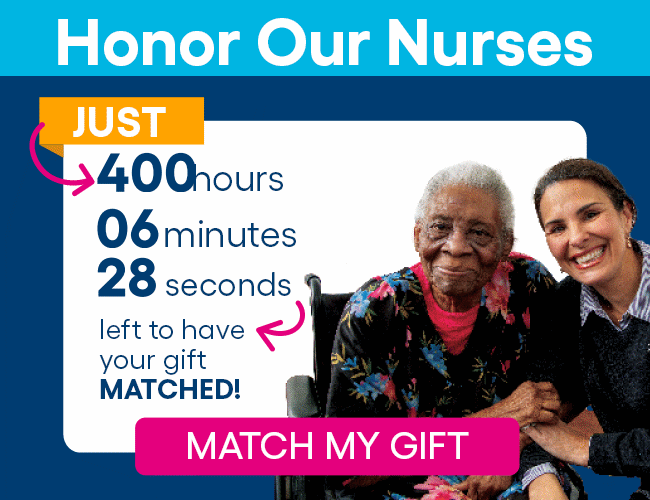Our people make us who we are – and nowhere is this more important than the team members who are out in the community. Whether they are providing care in a person’s home, at a community center, at our clinic in the Bronx, or responding to a mental health crisis in a public setting, they have the skills and sensitivity to meet the unique needs of all of our patients, plan members, and their loved ones, no matter what stage of life they are in.
VNS Health understands that:
- Our patients and plan members may be going through some of the most physically, emotionally, and financially challenging times in their life — and they’re relying on us for compassionate and holistic care.
- Providers are entrusting us with their patients, and we have the responsibility of keeping every person’s best interests in mind.
- Team members value working in an inclusive environment, having a work-life balance, getting to bring their skills to the table, and collaborating with other like-minded people to provide the best quality of care.
At VNS Health, we recognize that providing care and doing meaningful work in our communities is a team effort. Our team members collaborate to provide seamless care and improve health and wellness in the communities we serve.

In 2025, VNS Health was named to Crain’s “Best Places to Work in New York City” list.
The Many Roles at VNS Health
The people in our care and their families have many different touchpoints throughout their time receiving services from VNS Health. Our team members work as one to ensure that the full spectrum of each patient’s needs is being addressed.
The VNS Health care teams include:
Nurses are at the heart of home care and hospice care teams. A home care nurse (usually a registered nurse) develops and oversees a person’s plan of care, and a hospice nurse is the main point of contact on the hospice team.
Nurses’ responsibilities include :
- Taking care of medical needs, such as giving medications and cleaning wounds
- Helping patients and their families understand care plans and medications
- Coordinating services and appointments with other members of the care team, as well as with the staff if the person is at a skilled nursing facility or assisted living facility
- Supervising home health aides
- Communicating with a patient’s primary physician about any changes in their condition
- Monitoring vital signs
- Making sure that families have the supplies and medications that their loved one needs
In some cases, we may bring in specialty nurses, such as:
- Certified wound, ostomy, and continence nurses
- Oncology certified nurses
- Gerontological certified nurses
- Gender affirmation reassignment surgical specialists
- Nurses who can help manage conditions like diabetes and heart disease
Additionally, our behavioral health nurses can help people with their substance use and mental health needs. These nurses work in a variety of settings, including in a person’s home or out in the community.
Physical therapists work with people to build strength, flexibility, balance, and coordination. They can also help them relearn how to walk or find new ways to be mobile, teach them stretches to reduce stiffness, improve the function of a body part, and show caregivers how to help their loved one move without injuring selves or their loved one.
At VNS Health, our physical therapists work to the top of their license. When appropriate, they may be the one overseeing a person’s care, rather than a nurse.
Rehabilitation therapists help people regain skills that they may have lost after a stroke, injury, illness, or surgery. In addition to physical therapists (see above), patients may work with other rehabilitation specialists.
Occupational therapists help people with the fine motor skills required to perform activities of daily living, such as buttoning a shirt or shaving. They can also provide education about using special equipment that improves quality of life.
Speech-language pathologists help with regaining the ability to speak and understand speech. They can also help with strengthening the muscles of the face, mouth, and neck to improve the ability to chew and swallow and to help prevent choking.
Social workers help patients and their families meet emotional, environmental, and social needs. Their responsibilities include:
- Providing psychosocial support
- Identifying social and emotional barriers that may impede a person’s recovery and offering strategies to overcome them
- Counseling on long-term planning
- Assisting with paperwork, such as insurance forms and advanced directives
- Referring people to community resources, such as Meals on Wheels
- Guiding patients and families on making decisions, especially if there are disagreements about the best course of action
Some social workers specialize in specific areas. For example, hospice social workers work with families to ensure that funeral arrangements are in place and, at the time of the patient’s death, provide support with funeral details. Social workers who specialize in behavioral health can help patients with mental health needs.
Social workers also work as spiritual care counselors and bereavement counselors. Spiritual care counselors are available to all hospice patients and families, regardless of faith or religious affiliation. They can also arrange a ritual that honors a person’s personal or spiritual beliefs, or their religious or cultural heritage.
Bereavement counselors are available to families for 13 months after the death to help them get through the milestones of the first year.
Bereavement counselors also play an important role in leading grief support groups and workshops on topics such as relieving stress and getting through holidays without a loved one.
Home health aides (HHAs) are usually the members of the care team that spend the most time with a patient . They help with personal care tasks, including bathing, grooming, getting dressed, and shaving.
Additionally, they can:
- Keep track of symptoms and alert a care manager of any changes that warrant attention
- Remind a patient to take medication (but they cannot administer them)
- Help someone move safely around their home
- Go grocery shopping and prepare meals
- Watch for behavior changes that signal sadness, confusion, or memory loss
- Communicate with the coordinator of care if they believe that their patient’s condition is changing
Private-pay HHAs offer expanded services. For example, private-pay HHAs can:
- Accompany a person to and from medical appointments
- Work longer hours
- Provide companionship, with activities such as baking, crafts, and crossword puzzles
Additional Specialty Team Members
We are dedicated to making sure that there are not any gaps in a person’s care. Our care teams include a variety of experts who have specialized training and can help with very specific areas of care.
If a clinician or care manager thinks a person may benefit from working with other VNS Health team members, they may bring in specialists such as:
Liaisons in our Veterans Hospice Care, Veterans Home Care, and Veterans Outreach programs are veterans themselves, so they understand how military service — especially in combat — can affect a person. Liaisons listen to each veteran’s story. They can also provide information about benefits for veterans and can work directly with the Veterans Administration on your behalf.
LGBTQIA+ liaisons provide outreach to the community and can be brought in to work with people who self-identify as part of the LGBTQIA+ community. Like all of our team members, they have received special training to ensure that they are sensitive to the needs and concerns of LGBTQIA+ older adults.
Registered dietitians work primarily with hospice patients who have lost their appetite to ensure that they are still meeting their nutritional needs.

